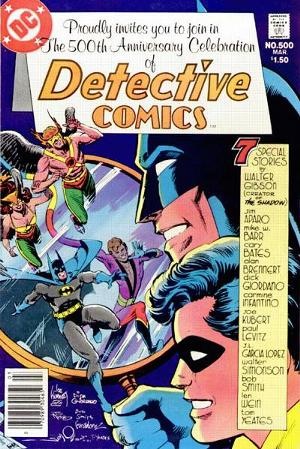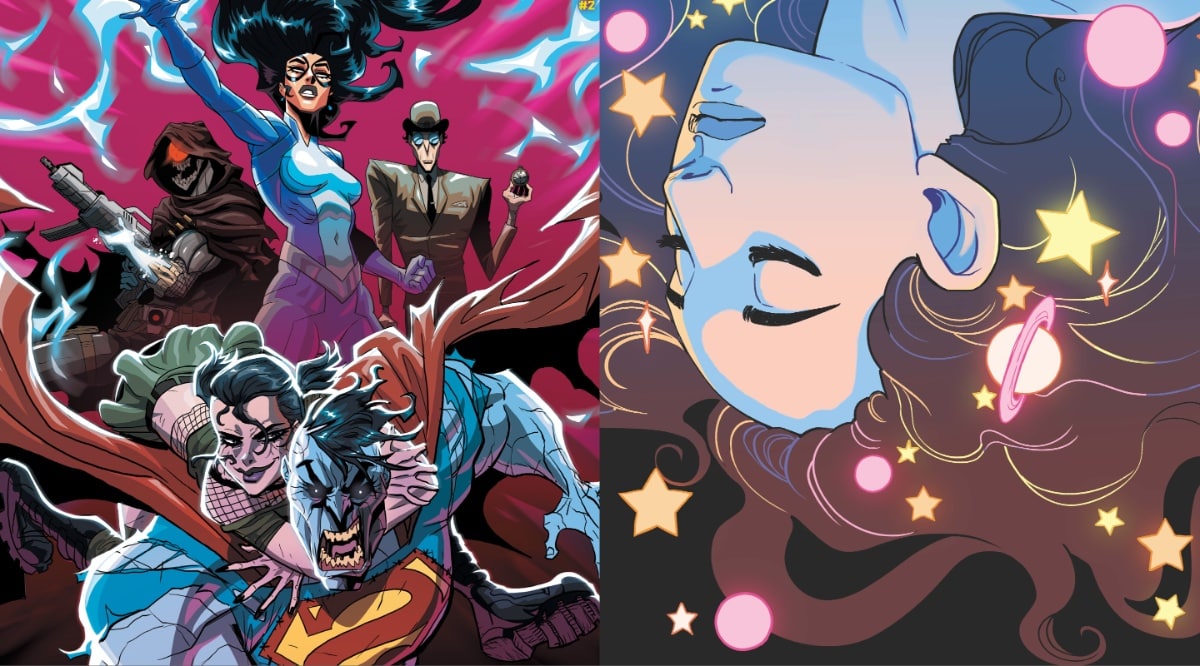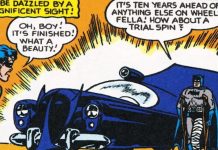
DC’s new royalty plan has already dealt a big setback to creator incomes. I’ve been hearing that equity deals—money given to creators of characters used in TV and film—are also on the endangered list. But this is the most vocal outcry yet.
WHY I WON’T BE WATCHING FOX’S “GOTHAM” THIS FALL
Back in 1981, in a story called “To Kill a Legend” in DETECTIVE COMICS #500, artist Dick Giordano and I created a character named Barbara Kean, the fiancée of Lt. James Gordon. (This was set on a parallel Earth where counterparts of the “real” Batman and his cast were twenty years younger.) A Golden Age “Mrs. James Gordon” (no first or maiden name) had appeared in 1951, mother of a son named Tony, but my character, later picked up by talented writers like Frank Miller and Barbara Randall Kesel, was clearly the prototype (with the same first name) for the “Post-Crisis” first wife of Lt. James Gordon, and—as Barbara Kean Gordon—became a supporting player in Batman continuity, and even made two movie appearances in BATMAN BEGINS and THE DARK KNIGHT.And this fall on GOTHAM, Fox’s prequel to the Batman mythos, one of the supporting characters will be…Barbara Kean, fiancée of Lt. James Gordon.
Ironically enough, on the same day that DC’s online news site listed the results of a fan poll in which I was chosen one of “the 75 greatest Batman artists/writers,” an executive at DC Entertainment—let’s call him “Johnny DC”—dismissed my request for “equity” (a percentage of income received when a character you create is used in other media) in the character. The justification? Because I had given her the same name, profession, and appearance as her daughter (at the time, just a sly wink to the reader), she was “derivative” of her daughter Barbara (Batgirl) Gordon and equity “is not generally granted” in derivative characters like wives, husbands, daughters, sons, etc., of existing characters: “this is the criteria by which all equity requests are measured.”
I then pointed out to him that writer Mark Waid had been told by then-DC management that DC did, in fact, give equity in “derivative” characters, just a smaller percentage—and indeed Mark and artist/co-creator Mike Wieringo received equity in the “derivative” character of Bart Allen/Impulse (grandson of Barry Allen/Flash) and received payments when he was used on SMALLVILLE. I suggested DC grant a similar reduced percentage on Barbara Kean, and I was willing to limit this to her appearances on GOTHAM and forget the movies.
How did Johnny DC respond to this? Did he rebut my argument? Nope. When confronted with the, shall we say, lack of veracity of his statement, he simply stopped responding to my emails.
Classy, right?
Now, let me be clear: I’ve since learned that the amount of money involved here can be as little as $45 an episode for a full equity character. So clearly I’m not in this for the money, but the principle. This is small change compared to the fact that the estate of Jack Kirby receives no share of the billions in dollars that Marvel/Disney makes from movies based on characters he co-created. But I suspect DC counts on the fact that the money is low enough that hiring an attorney to pursue it would cost more than you’d ever receive in equity payments. They also count on the fact that their freelancers depend on DC for work and thus will not publicly call them out. (And sometimes these freelancers are the very ones for whom that little bit of extra money would mean a lot.)
But as a novelist I depend in no way on DC for my livelihood, and have no problem recounting the bad faith they have demonstrated to me. But I take little satisfaction in it. There was a time—under the management of Jenette Kahn, Paul Levitz, and Dick Giordano—when DC went to great lengths to credit and compensate creators. They felt it was money well spent, because it brought other creators to the company and everyone benefited. I was actually proud to be associated with a comics company with a conscience. I hope my experience with the “new” DC is not typical, and that they still have a conscience. But I sure don’t see it from where I sit.
(If you’re a fan of my comics work, feel free to share.)








Well, it’s probably less then $45 per episode, since Barbara Kean is arguably a derivative character, but Mr. Brennert certainly seems to be owed some money. All I can add is, Mr. Brennert, meet Tony Isabella. Ask him about his problems with DC and his character Black Lightning.
Wonder if the contract draws the distinction between “original” and derivative characters. There’s plenty of legal precedent defining derivative characters as legally distinct from the original (Superboy, Medieval Spawn); if the contract explicitly states that derivative characters won’t be considered in equity deals, then the law’s on DC’s side, but if it doesn’t, it’s probably on Brennert’s.
But even if the law IS on his side, he’s right that it’s not worth the money to take it to court. It would take somebody like Gaiman, who didn’t need the money but was bent on setting a legal precedent on behalf of other creators, to do that.
Alan is one of the best Batman writers ever. However, one wonders where he was when DC fired Mike W. Barr, another of the best Batman writers ever, from his editor’s position because Barr called for Bill Finger to receive Finger’s rightful credit on Batman.
I find it sadly ironic that, as freelancer after freelancer complains about DC policies and treatment, you can’t find evidence of them ever speaking out when it happened to others. I don’t exclude myself from that group, but I’ve tried to at least weigh in on these things for a couple decades now.
The height of such irony for me was when Greg Rucka complained about DC. I think he knows the writer who ate my lunch when it came to Black Lightning: Year One.
Historically, Major Malcolm Wheeler-Nicholson, the founder of the company that became DC, was the first creator shafted by DC. He was forced out of DC by his sleazy partners, Harry Donenfeld and Jack S. Liebowitz. DC has been giving the shaft to creators since it was founded. It’s not likely to change now that the company is run by Hollywood clowns and wannabes.
DC has proven it will go to any lengths to win in court. You need look no further than its hounding of the late Joanne Siegel with bogus deposition after deposition…in the full knowledge of her uncertain health.
DC is what it is. What it has always been despite the occasional creator who has been treated well. It’s a scorpion that acts according to its scorpion nature and never to be trusted.
In short…
Forget it, Jake. It’s Chinatown.
Sadly, this is the type of stuff that Paul Levitz excelled at in making sure all the creators got their monetary due whenever anything was used and is no doubt one of the major reasons WB didn’t want him around after Miss Nelson came into position.
I believe that anyone thinking of working for DC might want to give Tony a call before signing anything. Obviously, Warner/DC feels no obligation to pay anyone other than corporate execs who have created nothing. The DC universe was built on the screwing of the creators of their best known character, so nothing the current Powers That Be do should come as a surprise to anyone that knows some industry history.
Between this and the no ‘big red S’ for a statue commemorizing a child abuse victim, I feel even better that I am no longer supporting the company after a forty yr stretch. The lack of enjoyment led me to dropping the line, their lack of character makes me disgusted. Glad I can go back and enjoy the efforts of Brennert, Levitz, Isabella et al.
Evan…my troubles with DC started before Paul Levitz was in charge and continued while he was in charge and continue to this day.
Interesting that fans constantly speak out against Marvel’s policies but remain largely silent on DC. Maybe they’ve bought the DC P.R. that disagreements with creators were settled when Siegel and Shuster got a pension and credit as Superman’s creators.
Glad to see Brennert is still around, even if his former employer is shafting him. He wrote the best Ben Urich story ever, and still one of my favorite standalone comic-book stories, in Daredevil No. 192 (March 1983). Worth seeking out.
http://www.comics.org/issue/37218/
>> Glad to see Brennert is still around, even if his former employer is shafting him.>>
If you like Alan Brennert’s comics, you should read his novels.
His latest, PALISADES PARK, is a real winner, and his earlier novel MOLOKA’I is a masterpiece.
TIME AND CHANCE is pretty excellent, too.
kdb
So, as things stand, DC is shafting past creators who aren’t currently working for them, and with their newly revised (in name only) royalty plan, they’re also sticking it to their current crop of writers and artists. And just why, pray tell, will the next generation of star talent ever want to work for DC?
Because like Marvel, DC knows there will always be somebody to pick the cotton.
Fanboys love the characters and will – at first – happily do & put up with whatever in order to work on those characters and get paid for it.
“Because like Marvel, DC knows there will always be somebody to pick the cotton.”
Comparing a comic book writer to slavery is not only hyperbolic but offensive.
Tony, I know of your problems with DC and the long history. I look at them separate from this issue. Your story is a whole other book.
Time Warner/DC stiffing people over a pittance!!? Nothing like this has EVER happened before!! I am SHOCKED, I tell you… just SHOCKED!!
Erik Scott: Even though slavery ended about 150 years ago, cotton is still being picked.
Could it be argued that DC Editorial was moved to Los Angeles for one key reason, namely the enforcement of Hollywood-style accounting rules upon the freelance talent?
Erik “there will always be somebody to pick the cotton” is what Marvel President said Terry Stewart allegedly said when Todd McFarlane & Rob Liefield brought up similar questions before starting Image.
More details here: http://web.archive.org/web/20120324014429/http://archives.tcj.com/3_online/n_image1.html
Didn’t we cover this last year when “Man of Steel” came out, where Mark Waid and Grant Morrison and other writers whose material was used in the movie weren’t compensated (or even credited)? Here’s what Waid said at the time: (http://thrillbent.com/blog/how-dc-contracts-work/)
“The confusion about extra-media compensation arises in that Levitz, while he was DC’s publisher, made it a policy to cut respectable bonus checks to writers and artists, regardless of legal obligation, if elements from any of their stories (even work-for-hire ones) made it into outside media adaptations movies or TV shows [examples deleted]. It wasn’t legally necessary, it was totally at Paul’s discretion and only Paul knows what math he used to determine what he felt would be fair, but it was a goodwill gesture from an exec sympathetic to the creative community.
Once Paul left, that courtesy was deemed no longer necessary by the executives and the policy was rolled back, as was DC’s absolute prerogative. Currently, DC pays bonuses only on material that’s a straight and highly faithful adaptation of existing work [examples deleted]. DC has removed itself from the complicated business of having to evaluate how much certain adapted elements are “worth” and instead simplified the system to “pay” or “don’t pay,” with “don’t pay” the default. “
Comments are closed.